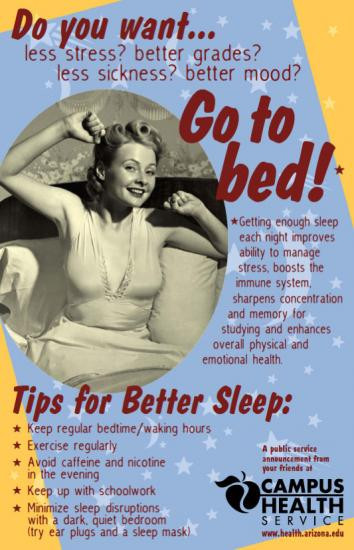COLLEGE IN THE 401: Brown Research on Sleep-Deprived Students
Tuesday, September 06, 2011
A new study conducted by researchers at Brown University and the University of Arizona, published in the Journal of American College Health, discovered that college students both underestimate the amount of sleep they need and reported, on average, clinically disturbed levels of sleep.
Researcher Kathryn Orzech, a postdoctoral fellow in sleep research at Brown University, found that the average bedtime for college students surveyed at the University of Arizona varied between 12:21 AM and 12:44 AM depending on the semester. The average number of hours slept ranged from 6:41 to 6:52.
The survey also used the Pittsburgh Sleep Quality Index, or PSQI, which serves as the common clinical measure to define insomniacs. PSQI measures answers to questions like: how many hours the patients sleeps, how much time spent trying to fall asleep, and exhaustion felt throughout the day. The clinical cut-off for disturbed sleep is greater than five—these students were 6.38 on average for males and 6.69 for females.
What hinders, and helps, a student's sleep
In the study, college students reported that the top hindrances preventing them from sleep included: dorm noise, socializing with roommates, schoolwork, and personal health issues. The most helpful factors included: taking time to unwind, creating a comfortable room, being prepared the next day, having a snack, and exercising.
Campaigning for sleep
Their interventions, says Orzech, would follow the blue print of other campus health promotions used to publicize different issues like moderate drinking and safe sex. These methods include putting up posters, advertising in the campus newspaper, and publishing a “Snooze-Letter” pamphlet to leave in campus centers, dorms, and health centers. The information would advise students to keep regular bedtime hours, exercise, avoid caffeine and nicotine in the evening, wear earplugs—simple solutions that resonated, Orzech says.
GET THE LATEST BREAKING NEWS HERE -- SIGN UP FOR GOLOCAL FREE DAILY EBLASTConnecting sleep to physical, mental health
Moving forward, now Orzech is doing research about how lack of sleep could lead to acute health problems, like colds and the flu. “There is not a lot of research about this,” she says, “There is a bit—one looking at antibodies, shows that people who sleep more have better antibodies against the flu.”
What has been more studied has been the connection between sleep duration and mental health. “Sleep duration is certainly connected to depression, but it’s a two-way street. Do you have trouble with sleep because of depression, or does does troubled sleeping lead to depression?” says Orzech, “There is a relationship there.” The same situation exists with substance abuse, where there is also a strong connection between the two.
Gateway to sensitive topics
Through surveys and interviews, the researchers also discovered that poor sleep might be a gateway for health providers to tackle more sensitive issues. Getting a chance to talk, Orzech found, really opened up the students to talk about other physical and mental health issues.
“If you talk about sleep, you can find out a lot of other things about their mental health, that they wouldn’t have brought up at other times,” said Orzech, “They might talk about health problems or issues of depression.”
Related Articles
- Are College Kids Too Stressed to Succeed?
- COLLEGE IN THE 401: Back-to-School College Events
- COLLEGE IN THE 401: Best Late-Night Eats
- COLLEGE IN THE 401: Guides, Tips + More
- BACK TO SCHOOL 2011: Tips for Healthy College Living
- BACK TO SCHOOL 2011: Budget Tips for College-Bound Kids




